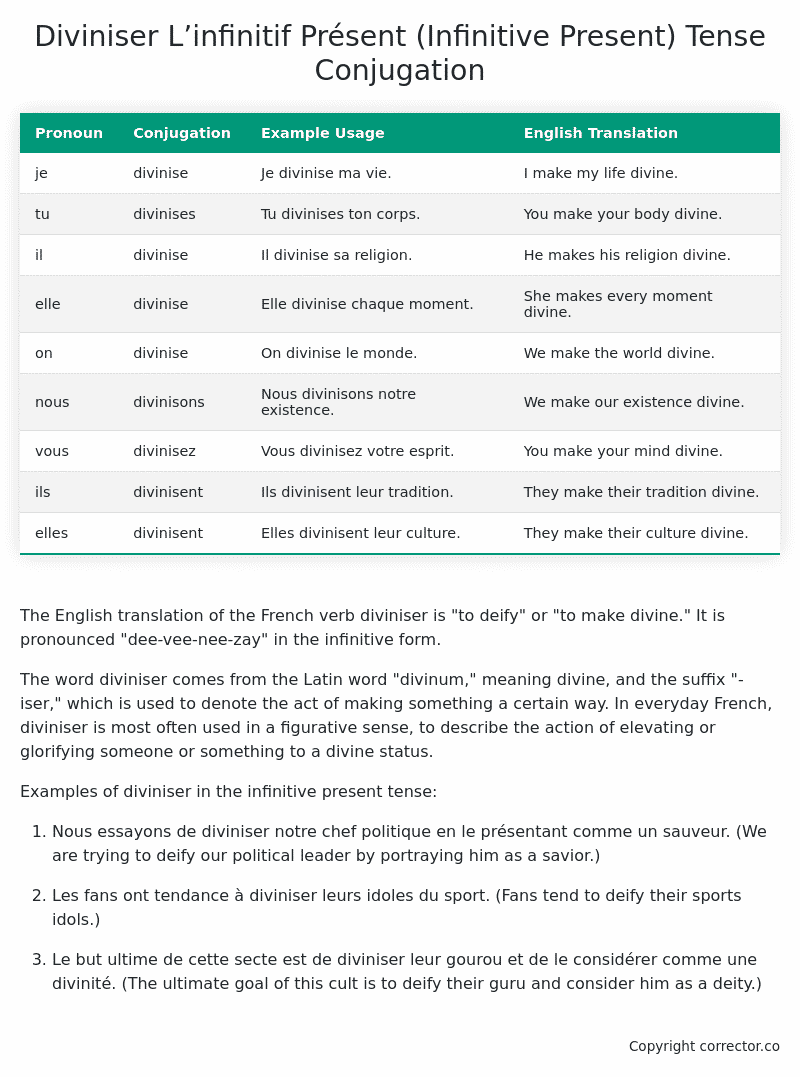L’infinitif Présent (Infinitive Present) Tense Conjugation of the French Verb diviniser
Introduction to the verb diviniser
The English translation of the French verb diviniser is “to deify” or “to make divine.” It is pronounced “dee-vee-nee-zay” in the infinitive form.
The word diviniser comes from the Latin word “divinum,” meaning divine, and the suffix “-iser,” which is used to denote the act of making something a certain way. In everyday French, diviniser is most often used in a figurative sense, to describe the action of elevating or glorifying someone or something to a divine status.
Examples of diviniser in the infinitive present tense:
-
Nous essayons de diviniser notre chef politique en le présentant comme un sauveur. (We are trying to deify our political leader by portraying him as a savior.)
-
Les fans ont tendance à diviniser leurs idoles du sport. (Fans tend to deify their sports idols.)
-
Le but ultime de cette secte est de diviniser leur gourou et de le considérer comme une divinité. (The ultimate goal of this cult is to deify their guru and consider him as a deity.)
Table of the L’infinitif Présent (Infinitive Present) Tense Conjugation of diviniser
| Pronoun | Conjugation | Example Usage | English Translation |
|---|---|---|---|
| je | divinise | Je divinise ma vie. | I make my life divine. |
| tu | divinises | Tu divinises ton corps. | You make your body divine. |
| il | divinise | Il divinise sa religion. | He makes his religion divine. |
| elle | divinise | Elle divinise chaque moment. | She makes every moment divine. |
| on | divinise | On divinise le monde. | We make the world divine. |
| nous | divinisons | Nous divinisons notre existence. | We make our existence divine. |
| vous | divinisez | Vous divinisez votre esprit. | You make your mind divine. |
| ils | divinisent | Ils divinisent leur tradition. | They make their tradition divine. |
| elles | divinisent | Elles divinisent leur culture. | They make their culture divine. |
Other Conjugations for Diviniser.
Le Present (Present Tense) Conjugation of the French Verb diviniser
Imparfait (Imperfect) Tense Conjugation of the French Verb diviniser
Passé Simple (Simple Past) Tense Conjugation of the French Verb diviniser
Passé Composé (Present Perfect) Tense Conjugation of the French Verb diviniser
Futur Simple (Simple Future) Tense Conjugation of the French Verb diviniser
Futur Proche (Near Future) Tense Conjugation of the French Verb diviniser
Plus-que-parfait (Pluperfect) Tense Conjugation of the French Verb diviniser
Passé Antérieur (Past Anterior) Tense Conjugation of the French Verb diviniser
Futur Antérieur (Future Anterior) Tense Conjugation of the French Verb diviniser
Subjonctif Présent (Subjunctive Present) Tense Conjugation of the French Verb diviniser
Subjonctif Passé (Subjunctive Past) Tense Conjugation of the French Verb diviniser
Subjonctif Imparfait (Subjunctive Imperfect) Tense Conjugation of the French Verb diviniser
Subjonctif Plus-que-parfait (Subjunctive Pluperfect) Tense Conjugation of the French Verb diviniser
Conditionnel Présent (Conditional Present) Tense Conjugation of the French Verb diviniser
Conditionnel Passé (Conditional Past) Tense Conjugation of the French Verb diviniser
L’impératif Présent (Imperative Present) Tense Conjugation of the French Verb diviniser
L’infinitif Présent (Infinitive Present) Tense Conjugation of the French Verb diviniser (this article)
Struggling with French verbs or the language in general? Why not use our free French Grammar Checker – no registration required!
Get a FREE Download Study Sheet of this Conjugation 🔥
Simply right click the image below, click “save image” and get your free reference for the diviniser L’infinitif Présent tense conjugation!

Diviniser – About the French L’infinitif Présent (Infinitive Present) Tense
Forming the Infinitive Present
Common Everyday Usage Patterns
As a Verb’s Dictionary Form
After Modal Verbs
As an Imperative
In Infinitive Clauses
Interactions with Other Tenses
Present Tense
Future Tense
Conditional Tense
Passé Composé
Imperfect Tense
Subjunctive and Conditional Moods
Summary
Want More?
I hope you enjoyed this article on the verb diviniser. Still in a learning mood? Check out another TOTALLY random French verb conjugation!


